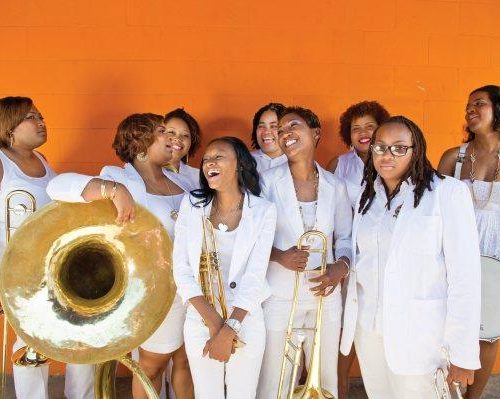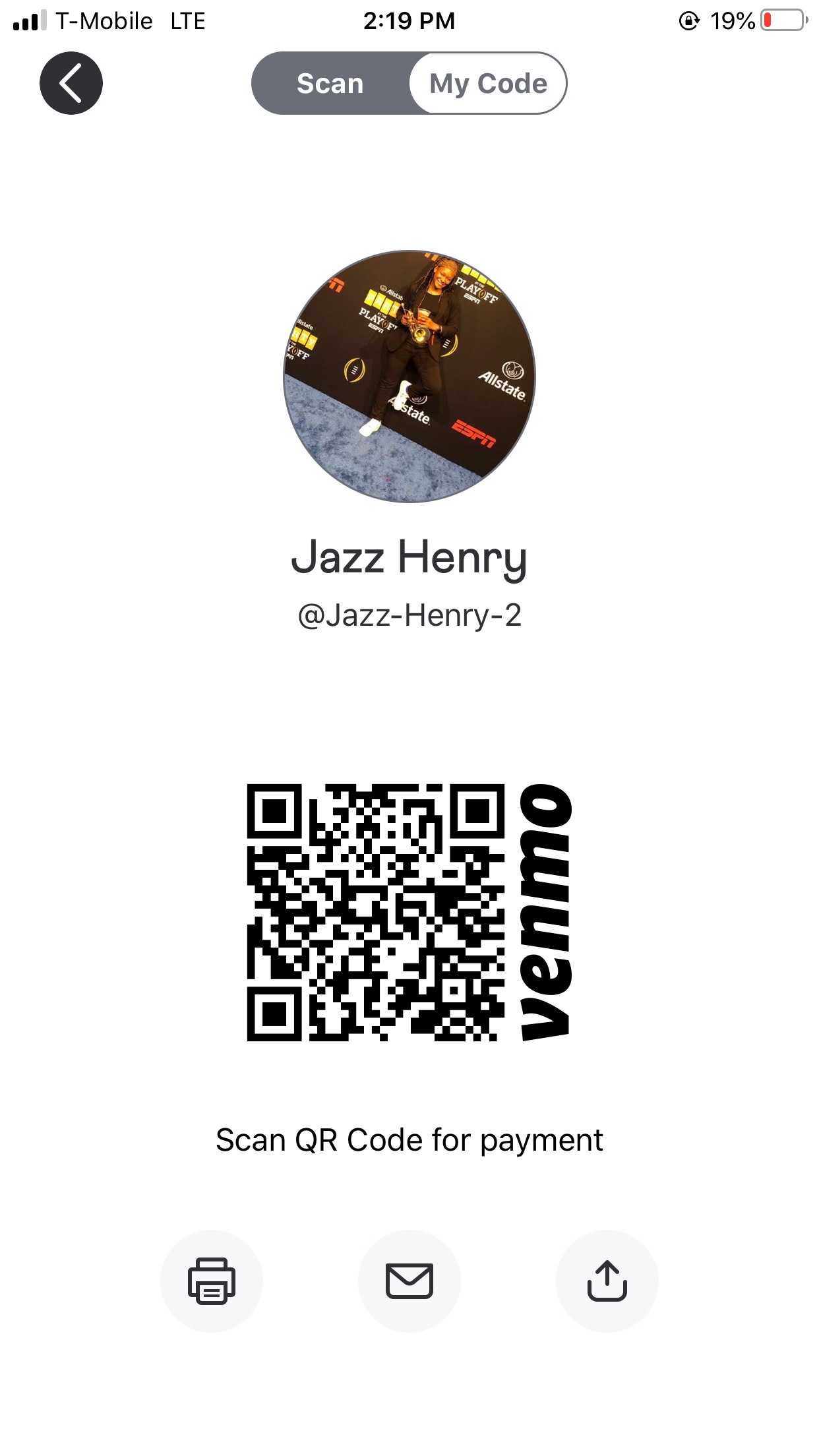
Jazz Henry. (Photo provided by: Jazz Henry)
In the Crescent City, there was the birth of jazz and then there was the birth of Jazz. Jazz Henry says of New Orleans, “We have music for everything: a party, a funeral. Everything here has to involve some type of music.” It’s only natural to find your way towards music in the Big Easy, and Henry embraced the sound of the city entirely.
She got her start at age 12 in a marching band for the Roots of Music program. After tossing the clarinet and picking up her horn, Jazz continued marching for her high school band. Music fever infected more than just Henry’s hometown—she’d often wake up to the sounds of her dad playing. Her father, famous trombonist Corey Henry, along with other New Orleans artists like Trombone Shorty, Derrick Tab, Hot 8 Brass Band, Rebirth Brass Band, and Glenn Andrews buzzed around Henry’s home. She speaks of their influence in her life, saying, “All those guys are like uncles and family to me who definitely encouraged me to practice, to get better because this music can really take you to anywhere in the world.”
While the musician in Jazz is fostered by her dad and these “uncles,” the strength in Jazz is fostered by her mom. The mother daughter duo is featured in the documentary directed by Richard Barber entitled The Whole Gritty City. Henry’s mom constantly hustled to provide and took no handouts—even when there was only enough food to feed the kids. Henry lovingly expresses her mom’s impact on her: “In my mind, I’m mentally strong enough to do whatever I need to do. If I don’t have it, by tomorrow, I’ll find a way to get it. That’s the kind of thinking and thought process that my mom has…My mom is my inspiration for me to go as hard as I do.” Henry’s mom mentions in the 2013 documentary that her daughter is her best friend. When Henry is asked about her mom in 2020, she echoes the exact same sentiment. It’s no wonder that Henry finds her “Krewe” with the fierce women of the Original Pinettes Brass Band (the only all-female brass band in existence). All of this and her name is Jazz? Henry’s career seemed written in the stars.
Jazz Henry’s relationship to music lives and breathes in the city of New Orleans. New Orleans culture is rooted in groove and celebration and is considered by many to be the birthplace of jazz music. With that in mind, the history of New Orleans is important to consider when listening to Jazz Henry’s music and how this history affected her personal approach to becoming a musician. The link between Jazz’s music and New Orleans cannot be overemphasized. Michel Foucault discusses the importance of tracing the process of a timeline, and in Jazz’s case, her timeline is incomplete without New Orleans. We must focus on the connections between her background and how it shaped her life path, eventually driving her to pursue music. Inevitably, New Orleans’ musical soul “attached(d) itself to (her) body. It inscribed itself in (her) nervous system, in temperament, in (her) digestive apparatus” (Foucault, 1971). So you really could say, Jazz Henry lives and breathes New Orleans. Being born in the Big Easy forged the artistic space and mindset necessary to come the musician she is today as the experiences, opportunities, and happy little accidents of the city are the essence of her being.
Jazz Henry can’t help but ‘get the funk down’ when the brass-band rhythms of New Orleans’ “second-line Sundays” flow-through air. If you are talking second-lines, you are talking New Orleans brass bands. The sounds of snare drums, saxophones, trumpets, and tubas lead the unbuttoned and informal parties that flood the streets. These second-line Sundays shape and communicate what New Orleans is all about—collective indulgence and celebration, coming together and letting loose in the presence of music.
Jazz talks about how “can’t help but dance” type second-line sound—a blend of the traditional marching band sound with jazz, funk, r&b, disco, etc.— influenced the trajectory of her music career, as well as her identity and values. Henry describes the scene of a second-line Sunday as one in which “the vibe, the energy, and the positivity are unmatched” so much so that “people from all over the world travel to New Orleans just to be a part of it.” She explains how New Orleans is home to “the only people with this type of music, with this culture,” a culture that she promises cannot be found anywhere else.
For Jazz, a second line Sunday embodies what music has come to mean for her. She is touched by brass band music’s capacity to ignite celebration, dancing, and authentic communal fun. It’s about the energy for Jazz. “Energy” is the only way she can describe it. It’s nearly impossible to vocalize the feelings that the NOLA atmosphere arouses, particularly those caused by the musical culture. This energy is what Jazz seeks to recreate through her music and sound as a trumpet player when performing with her all-women brass band, the Pinettes, and other musicians. Jazz reflects on the power of the in-person experience of New Orleans brass band music. Specifically, how it creates deep vibrations between the performer and audience. She can further pour that energy back into the people through her playing if she can feel that type of vibe around (while) performing. These specific to New Orleans vibrations continuously drive Jazz Henry’s artistic pursuit within the realms of music and beyond.
Jazz describes the Pinettes as a second family for her, declaring that she was welcomed wholeheartedly, labeling the other members of the group her “sisters”. The band members act as a sort of family to one another, always making sure that everyone is taken care of whether that means emotional support or help with homework. Furthermore, Jazz highlights the uniqueness of the Pinettes brass band, as they are the only all-female brass band in the world. “We’ll take the title as the first female brass band, but we don’t want to be the only either” Jazz states, encouraging the younger generation to come and play with them.
Despite the uncertain times of Coronavirus and quarantine, Jazz Henry continues to work hard on her career with various projects on the horizon. During quarantine, the Pinettes have released a couple live streams yet are primarily focusing their attention on their upcoming album said to be released by the beginning of next year. In addition to the Pinettes, Jazz has been working on her own music as well as collaborating with her dad on a new track. Jazz also hopes to expand her work beyond the realm of music into an upcoming film project as well. Jazz hopes to share her love of New Orleans culture further through a film about footwork in celebration of second line. Furthermore, Jazz hopes to gain further traction as an entrepreneur with her new business “Hoewitch Dessert Bar NOLA”, a bakery dedicated to alcohol infused desserts for those 21+. Jazz co-runs the business with her two friends and the trio hope to open up in the near future. Living in New Orleans, a cultural hub and buzzing tourism spot, grants Jazz freedom to explore other routes of her creativity other than music and expand her career. “I’m an artist in general,” Jazz declares, showing her creativity is not only limited to the world of music but to everything she sets her mind to.
This piece is part of the on-going series “The Social and Political Commentary of Music Reviews,” which is part of an Alternative Journalism course at Tulane University taught by Dr. Christine Capetola.
You can donate to Jazz’s tip jar here:

 NOLAbeings
Multimedia artist Claire Bangser created NOLAbeings as a portrait-based story project that marries...
NOLAbeings
Multimedia artist Claire Bangser created NOLAbeings as a portrait-based story project that marries...
 Data corner: Adobe Suite (create a PDF, social media graphic, presentation, edit a photo and video
Data corner is where you go to work with analytics and top tech skills. It takes on everything from PERL and SQL to Canva and Sprout Social.
Data corner: Adobe Suite (create a PDF, social media graphic, presentation, edit a photo and video
Data corner is where you go to work with analytics and top tech skills. It takes on everything from PERL and SQL to Canva and Sprout Social.
